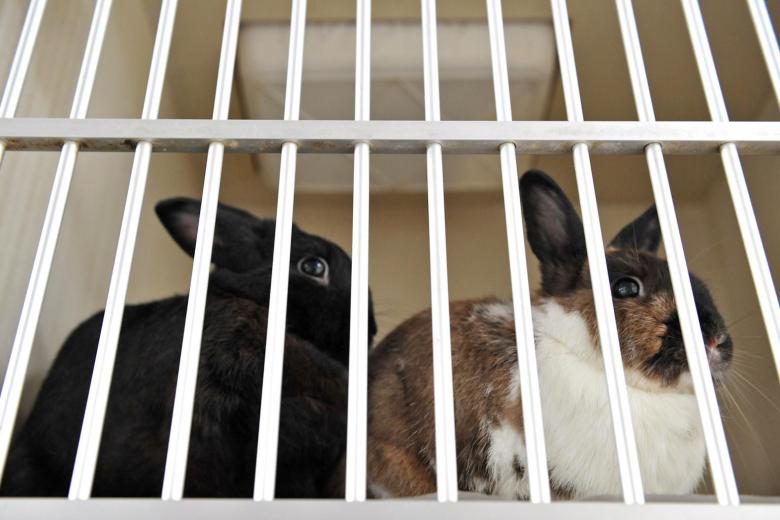SINGAPORE - A highly contagious, acute and fatal disease that affects only rabbits was first detected in Singapore on Wednesday (Sept 16), the Animal and Veterinary Service (AVS) said in a statement on Thursday.
Known as rabbit haemorrhagic disease (RHD), it is not transmissible from animals to people and does not affect other animal species, added the AVS, which comes under the National Parks Board.
"The virus that causes RHD was detected in samples from pet rabbits submitted by a veterinary clinic. Based on investigations so far, there may be up to 11 affected rabbits in the cluster and eight have died.
"None of the cases are known to have a travel history. Epidemiological investigations are ongoing," the AVS said.
AVS said it is investigating the possible sources and spread of the disease. It will also be working with veterinary clinics and distributors on importing and registering vaccines for RHD.
While there is no specific treatment available for RHD, supportive care can be provided for infected rabbits.
RHD emerged in Europe in the 1970s or 1980s, and has since become endemic in locations where European rabbits are found in the wild such as Europe, Australia, New Zealand, Cuba, and parts of Asia and Africa.
The virus that causes the disease is transmitted between rabbits through direct contact with infected fluids, fur and carcasses. Transmission through objects such as shoes, clothing and equipment, and insects have also been recorded.
The incubation period of RHD is between one and five days.
Clinical signs include anorexia, dullness, prostration, nervous signs, groans and cries, or respiratory signs such as breathing difficulties or discharge from the nose.
Death may occur within 12 to 36 hours once clinical signs develop.
Surviving rabbits can continue shedding the virus for at least a month after they recover.
It is a notifiable animal disease in Singapore - one that must be reported to the AVS and the World Organisation for Animal Health.
Dr Sarah Wong, veterinarian at Mount Pleasant (East) under the Mount Pleasant Veterinary Group (MPVG), recommended that owners practise "social distancing for bunnies"by keeping them safe indoors, and minimise contact with other rabbits.
"The risk of RHD is low for rabbits housed indoors with minimal exposure to rabbits from other households. However, RHD is highly contagious among rabbits via body fluids such as saliva, urine, nasal discharge, and also via contaminated objects," Dr Wong said.
This means that rabbit owners may inadvertently transmit the disease to their own rabbits if they handle a diseased rabbit, then handle their own rabbit before disinfecting their hands and clothes properly.
MPVG is currently working with the AVS to obtain vaccines for RHD, but it has not seen any RHD cases in its eight clinics yet.
Consultations at MPVG's clinics are on an appointment-only basis, and pet owners bringing unwell rabbits in for treatment are advised to call ahead.
This is so vet teams can be prepared with strict sanitation and disinfection protocols at the point of arrival and during consultation and hospitalisation, to minimise the risk of disease transmission between rabbits.
"We will also be increasing the frequency of disinfection in our rabbit isolation areas. Any suspected RHD cases seen will be reported to AVS," said Dr Wong.
Ms Jacelyn Heng, vice president of House Rabbit Society Singapore (HRSS), told The Straits Times it is concerned the disease has made it to Singapore.
"Rabbits here have never needed any vaccinations as we were kept very safe from such a virus. Now all rabbits in Singapore may require vaccinations in the future," she said.
Ms Heng urged all rabbit owners to keep calm, and not abandon their pets, as RHD does not affect humans or any other animal species.
"Take your rabbits for veterinary treatment if they are unwell. Apart from following hygiene precautions, please let your bunnies stay home, to stay safe," Ms Heng said.
The AVS advised pet owners to:
- Minimise contact between their pet rabbits and visitors and other rabbits, especially if the owners are not aware of their health status;
- Practise good personal hygiene, such as washing their hands with soap before and after being in contact with their pets or other animals;
- Keep the housing and environment of the rabbits clean, as the virus can spread through contact with contaminated surfaces, and insects such as flies;
- Bring their pets for veterinary treatment, if they observe their pets to be unwell.


